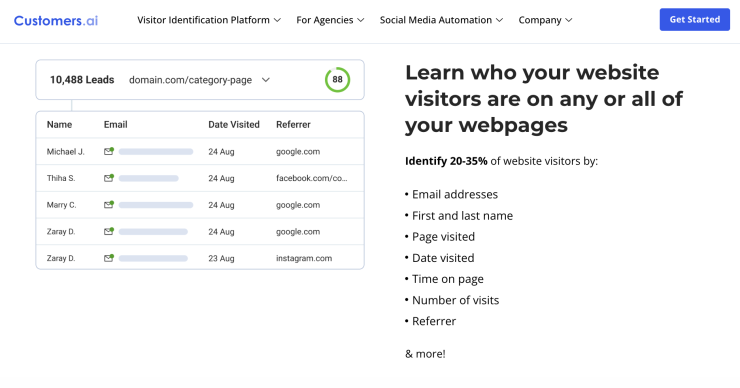A strong online presence is essential for B2B companies to thrive. However, simply having a website is not enough – understanding how prospects interact with it is crucial.
This is where B2B website visitor tracking comes into play.
By tracking and analyzing your website visitors, you can gain invaluable insights to supercharge your sales and marketing strategies.
What Is B2B Website Visitor Tracking?
B2B website visitor tracking is the process of identifying and monitoring the companies and individuals that visit your website. It goes beyond basic web analytics by revealing the businesses behind website traffic, rather than just showing metrics like pageviews and bounce rates.
With B2B visitor tracking software, you can access the company name, location, industry, and other firmographic details of your website visitors. Some tools even allow you to view the names and job titles of key individuals at those companies.

This level of insight is incredibly powerful for B2B sales and marketing teams. Instead of operating blindly, you can focus your efforts on the most promising prospects actively engaged with your brand online.
How Does B2B Website Visitor Tracking Work?
While the underlying technology can be complex, the basic premise of B2B visitor tracking is simple: it matches IP addresses to real companies and people.
When someone visits your website, their IP address is logged along with details about their browsing session, such as which pages they viewed and for how long. The visitor tracking tool cross-references that IP address against a database of businesses to identify the company and potentially the individual user.
However, there are many nuances and challenges involved in accurately mapping IPs to companies. IP addresses can be shared, spoofed, or routed through proxies. Businesses may have multiple office locations or employees working remotely. These are just some of the reasons why high-quality visitor tracking requires sophisticated algorithms and databases.
Top Use Cases for B2B Website Visitor Data
Okay, so you can see which companies are visiting your website. But what can you actually do with that information?
Here are some of the top ways that B2B sales and marketing teams are leveraging visitor tracking data:
-
Lead Identification and Scoring
When a high-fit company visits your pricing page or downloads a piece of content, that’s a clear buying signal. Visitor tracking allows you to instantly identify these hot leads and prioritize follow-up. -
Account-Based Marketing
With account-level visibility into your website traffic, you can focus digital advertising and other marketing efforts on specific target accounts that are researching your solutions. -
Sales Intelligence
Before a sales call or meeting, reps can review which web pages a prospect has visited to understand their interests and needs. This helps tailor conversations and messaging for better engagement. -
Content Optimization
See which types of content and topics resonate most with your target buyers by analyzing engagement metrics by company, industry, and other segments. Use these insights to optimize your content strategy. -
Competitive Intelligence
If a major competitor or their customers are snooping around your website, that could indicate upcoming churn risks or sales opportunities to be aware of and prepare for. -
Website Experience Optimization
Visitor tracking data can reveal pain points and areas for improvement on your website. For example, if certain pages have high exit rates for specific industries, you may need to tailor that content.
Key Takeaways
In the B2B space, website visitor tracking is a must-have capability for driving smarter, more targeted sales and marketing efforts. By identifying your anonymous website visitors, you can:
- Prioritize the hottest leads and opportunities for efficient follow-up
- Personalize outreach based on a prospect’s digital behavior and interests
- Optimize content and website experiences for your target buyers
- Stay one step ahead of competitors by monitoring their activity
- Identify areas for improvement on your website to enhance user experiences
With the right visitor tracking tool in place, your website transforms from a static online brochure into a rich source of actionable sales intelligence. If you’re not taking advantage of this powerful data, you’re leaving significant revenue potential on the table.
Invest in B2B website visitor tracking to gain a competitive edge and drive more efficient, effective sales and marketing.
FAQs
-
What is B2B website visitor tracking?
B2B website visitor tracking identifies the companies and individuals visiting your website by matching their IP addresses to real businesses and people. -
How does B2B visitor tracking work?
Visitor tracking tools log the IP addresses and other browsing characteristics of your website visitors and cross-reference them against databases to determine the associated company and user details. -
Why is B2B website visitor tracking important?
It provides valuable sales intelligence by revealing which specific businesses and prospects are engaging with your online content and digital presence. -
What information can B2B visitor tracking tools show?
Common data points include company name, location, industry, employee headcounts, and contact details for key individuals like decision makers. -
What are the top use cases for B2B visitor data?
Lead identification/scoring, account-based marketing, sales intelligence, content optimization, and competitive intelligence. - Is B2B visitor tracking legal and compliant?
Yes, as long as the data is used responsibly for marketing/sales purposes and no individual profiling is done without proper consent. -
What’s better: B2B visitor tracking or marketing automation?
They complement each other – visitor tracking identifies prospects, while marketing automation nurtures them through the funnel. -
How does visitor tracking integrate with CRM?
Many tools sync visitor data directly into CRM platforms, enriching contact and account records with digital engagement insights. -
What are some top B2B website visitor tracking tools?
Popular options include Customers.ai, ZoomInfo, Leadfeeder, LeadLander, and more.

